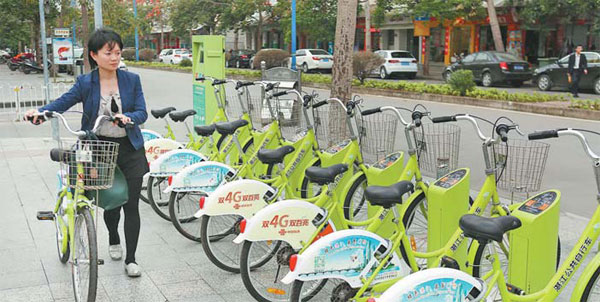Baosteel prioritizes environment in designs
By Li wenfang (China Daily) Updated: 2015-07-14 08:05
|
The local government encourages residents to use bicycles to protect the environment. [Photos Provided to China Daily] |
"Companies capable of growing together with nature and the ecological system make the future. Baosteel Zhanjiang is such a company and we are confident of building it into the best in this industry."
Rainwater collected at the mill, water from Jianjiang River and desalinated sea water make up roughly equal shares of the water used in production, with nearly 98 percent of the water recycled after use.
Wastewater from the coking process will be treated at an artificial wetland and reused, in a process that is also the first of its kind in the country, and some treated water will be discharged deep at sea, Gao said.
The sludge from water treatment can be used for making bricks or in the sintering process, with any iron it contains also recycled.
The slag from production, after the iron is recovered, can be used to produce cement and other building materials.
All solid waste will be primarily processed or made into products before being shipped elsewhere for further processing.
Containers of powdered materials and coal and the conveyer used for transporting materials are enclosed and storage places are equipped with screens to control dust.
A national environmental monitoring station has been installed at the complex, as well as three stations set up by the Zhanjiang city government and three others provided by Baosteel, with real-time data from the monitors transmitted to environmental watchdogs.
Baosteel also plans to share energy resources and materials with the gigantic Sino-Kuwaiti petrochemical project planned only 500 meters away on the island, and jointly use transport channels to maximize environmental efficiency.
- 2015 China International Fair for Investment and Trade kicks off in Xiamen
- China's commodity imports robust in Jan-Aug period
- China stocks rebound 2.92%
- 2015 China box office already past 2014 total
- China foreign trade decline widens in August
- Interview: JP Morgan's senior executive bullish on China
- Innovation, development the focus for NZ mayors
- Lives of freelancers


















